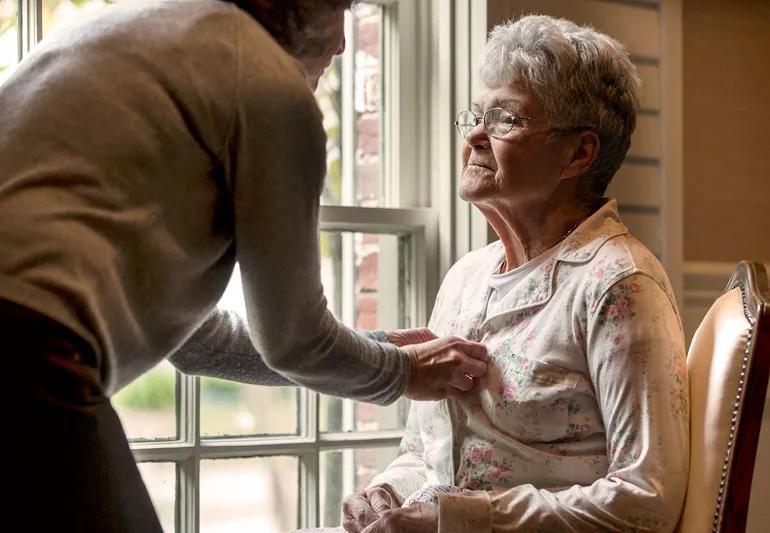How to prepare when bringing older relatives in-house

Image content: This image is available to view online.
View image online (https://assets.clevelandclinic.org/transform/503a2162-0b9e-4a2e-949e-e4f3dc0f4ee4/elderCareFamily-554374105-770x553_jpg)
Daughter taking care of her elderly mother at home
Do you have a parent living alone, becoming forgetful and not managing so well? Or are your aging parents struggling to care for each other in their home? If you are weighing the idea of moving a parent (or two) in with you, there are important considerations, says geriatric medicine specialist Ronan Factora, MD.
Advertisement
Cleveland Clinic is a non-profit academic medical center. Advertising on our site helps support our mission. We do not endorse non-Cleveland Clinic products or services. Policy
He says living with family makes it easier for older adults to keep up with daily activities, but to make it work, it’s important to talk to your parents honestly about current and future expectations. You also want to be realistic about the kinds of changes that can result.
“It’s often an easy move initially, but challenges can arise as medical problems increase. It’s a huge adjustment for everyone,” he says. Adults who provide care often feel sandwiched between the needs of their children and parents.
Here are five factors to consider.
You may worry that your parents are not eating properly on their own. Maybe it’s getting harder for your mom to cook. Or nothing tastes good and she just doesn’t feel like bothering.
It’s easy enough to stretch family meals, but many older adults have special dietary needs. It’s often more complicated than just adding an extra plate or two at the table.
Do you worry about your mom or dad still driving, or have they given up their car?
If they move in, you can do the driving and that resolves the safety issue. But how will their travel needs mesh with your schedule?
Whether you spend your days ferrying younger children around or you work all day, you’ll need to sort out transportation for your parent. But that effort is very worthwhile, Dr. Factora says.
Advertisement
Living alone can make it harder to stay active in social and volunteer activities or the church. Older adults living with family can often maintain these connections longer, he says. And that helps keep them healthy.
Having older family members in-house means you can watch for falls, memory lapses or other failings.
Maybe your mom can’t manage the stairs in her home anymore. But if you have stairs too, you might need to adjust sleeping accommodations or remodel so she can get around more easily, Dr. Factora says.
If your dad is forgetful about taking his medications, you can easily help with that if he moves in. (Make sure to keep medications out of reach of young children, though.)
Older adults usually forego bill payment and household management responsibilities when they move in, Dr. Factora says. Doing so frees them from having to keep track of due dates and bank accounts, which gets more difficult as we age. However, you can keep your mom or dad involved if there are tasks they can manage.
Caregivers frequently put their own needs on the back burner, but you can’t manage that way indefinitely.
Often they are the “forgotten patient,” and that’s why caregivers need to take breaks and hand off responsibilities to others in the household sometimes, Dr. Factora says. Or if you’re caring for an older adult by yourself, get someone to come in for a few hours each week to give you a break.
Setting schedules and sharing regular chores with the family also helps caregivers avoid overwork. If family members are stretched for time, there may be community agencies and resources available that can be used to support the family and the loved one.
You might find it hard to balance your own life with your older family member’s needs. It’s easy to lose track of your own interests or community involvement in favor of providing care. Create a calendar to help work everything into the schedule.
Move-in situations work best, Dr. Factora says, when everyone participates in decision-making. Talking things out from the start minimizes confusion and arguments down the road.
“I think it would be an ideal situation for older adults to move in with family members, though there are barriers to address for it to work,” he says.
Advertisement

Sign up for our Health Essentials emails for expert guidance on nutrition, fitness, sleep, skin care and more.
Learn more about our editorial process.
Advertisement
Tips on what to say and how to act when someone has cancer
Options for your changing mobility range from small swaps to major renovations
Your tolerance decreases with age, thanks to body changes, health conditions and medications you may take
Calling 911 or emergency services should always be your first step
Exercising and stretching your lower back, hamstrings, hips and quads can greatly improve your physical well-being
Many chronic conditions can cause fatigue — but don’t overlook mental health concerns, iron level and hormones
Some osteoporosis medications help slow bone breakdown, while others help grow new bone — what’s best for you depends on your needs
Getting close to their care team, investing in accessibility and implementing safe sleeping practices are just a few ways to support your child’s growth and development
Although it could be used as a moisturizer, this new trend is not recommended
Communicating clear limits helps protect your time, energy and emotional well-being
High cholesterol can be genetic, but testing and treatment can lower your heart disease risk